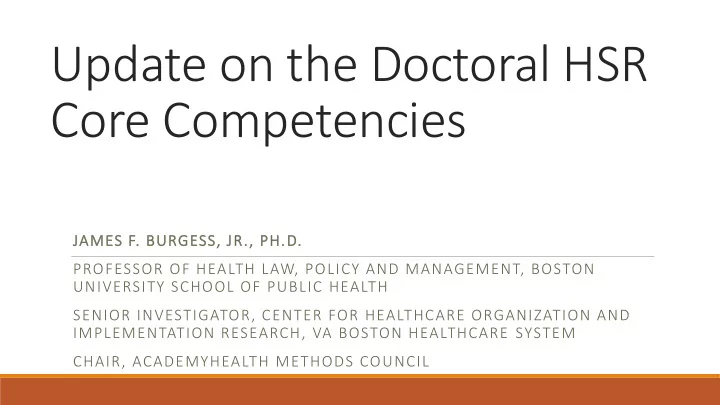

Update on the Doctoral HSR Core Competencies JAMES F. BURGESS, JR., PH.D. PROFESSOR OF HEALTH LAW, POLICY AND MANAGEMENT, BOSTON UNIVERSITY SCHOOL OF PUBLIC HEALTH SENIOR INVESTIGATOR, CENTER FOR HEALTHCARE ORGANIZATION AND IMPLEMENTATION RESEARCH, VA BOSTON HEALTHCARE SYSTEM CHAIR, ACADEMYHEALTH METHODS COUNCIL
Brief History of HSR Core Competency Development • Chris Forrest and Diane Martin, with AHRQ funding, held a series of meetings to develop Version 1 of these Core Competencies about 15 years ago • Diane Martin updated the Core Competencies into Version 2 in 2008 • The AcademyHealth HSR Methods Council has taken over the effort to continue development and implementation of the Core Competencies – we now propose Version 3 of the Core Competencies • This effort retains the structure of the Version 2 competencies, with updates focused on Methods as a result • Additional detail is provided on the relative prevalence of HSR Methods that could be considered as sub-competencies
HSR High Level Core Competencies Foundational Knowledge Data collection Conceptual Knowledge Research study conduct management Relevant and important HSR Data analysis question development Professional development Conceptual models and Effective communication operational methods Knowledge transfer Study designs
HSR High Level Core Competencies: Domains — Foundational and Conceptual Conceptual Knowledge: Foundational Knowledge: Variable depending on the discipline or Health and biology interdisciplinary area of specialization: Cost & financing of health care Organization of health care Economics Health policy Epidemiology Access and use Psychology Sociology Quality of care Anthropology Health/clinical informatics Management and Organizations Outcomes and effectiveness Demography Resource allocation Operations Research Political Science Health behavior Complexity Theory Social determinants of health Multi-Disciplinary Theory Construction Cross-cultural and global perspectives Relevant and important HSR question development Conceptual models and operational methods Study designs
HSR High Level Core Competencies: Domains — HSR Question Development & Conceptual Models & Operational Methods HSR Question Development: Conceptual Models & Operational Methods: • Scientific method and theory • • Scientific method and theory Proposal development • • Measurement and variables Conceptual framework development • • Concept models Health policy application • • Qualitative research methods Questions leading to solutions to health problems • Quantitative research methods • Big data and data mining techniques • Implementation science • Causal inference methods
HSR High Level Core Competencies: Domains — Study Designs and Data Collection Study Designs: Data Collection: • • Study design Survey research • • Survey research Qualitative research • • Qualitative designs Operations research • • Quantitative designs Data acquisition • • Mixed method designs Big data and data mining methods • • Intervention research File creation and database management • Community based participatory • research Quality control • • Evaluation research Sampling • • Quality improvement Health/clinical informatics • Population measures
HSR High Level Core Competencies: Domains — Research Study Conduct Management and Data Analysis Data Analysis: Research Study Conduct Management: • • Responsible conduct of research Advanced HSR data analytic methods • Ethics • • Economic evaluation Human subjects/IRBs • • HIPAA CEA/CBA • • Contracts and DUAs Statistics • Quantitative research • Measure development • Qualitative research • Decision sciences • Data acquisition • Sampling • Quality control & DMBs • Qualitative analytic methods • Research study management • Quantitative analytic methods • Organizations as subjects • Health care law and risk management
HSR High Level Core Competencies: Domains — Professional Development and Effective Communications Professional Development: Effective Communications: • • Teamwork Proposal development • • Leadership Dissemination • Team management • Communication skills • Conflict resolution • Marketing and persuasion • Knowledge management techniques • Project management • Writing skills • Stakeholder collaboration and involvement • Cultural sensitivity • Negotiation • Cross-cultural and global • Teaching perspectives • Mentoring • Cross-cultural and global perspectives • Life-long learning • Patient engagement skills integrating with research
HSR High Level Core Competencies: Domains — Knowledge Transfer Knowledge Transfer: • Evidence based practice • Evidence based policy • Human factors research • Complexity science • Change management • Operations research • Health marketing • Implementation science • Translational research • Tacit knowledge
Challenges of Qualitative/Quantitative/ Mixed Methods • As HSR Research Teams Continue to Diversify in Methods and Multi-Disciplinary Frameworks, Education Programs and Individuals in Lifelong Learning Struggle to Prioritize Sub-Competencies in Methods • Using a Google Search Algorithm We Also Have a List of Sub-Competencies in Methods That PhD Programs and Lifelong HSR Learners Can Use to Choose From, Some Examples:
Examples from New Table 4 of Relative Prevalence Competency or Skill Type # of Core Level Competency or Skill Type # of Core Level Google (Essential, Google (Essential, Intermediate, Intermediate, Scholar Scholar Familiar, Familiar, Hits Hits Optional) Optional) Variance Estimation Quantitative 1,000 Familiar Community Based Mixed 400,000 Essential Participatory Research Survey Analysis Mixed 1,000 Familiar Intensive Longitudinal Cognitive Interviews Qualitative 850 Optional Quantitative 300,000 Essential Study Bayesian Analysis Quantitative 850 Optional Pragmatic Clinical Trial Mixed 120,000 Essential Latent Class Analysis Quantitative 700 Optional Ordinary Least Squares Quantitative 100,000 Essential Statistical Process Regression Quantitative 650 Optional Control Significance Testing Quantitative 95,000 Essential Regression Analysis of Randomized Quantitative 500 Optional Quantitative 92,000 Essential Discontinuity Analysis Control Data Quantile Regression Quantitative 500 Optional Sample Selection Quantitative 81,000 Essential Models Narrative Summary Qualitative 500 Optional Sampling Mixed 65,000 Essential Structured Literature Mixed 400 Optional Randomized Control Reviews Quantitative 57,000 Essential Trial Design
Steps Moving Forward to Keep Dialogue Engaged • The Timeline for Continuing Discussion of the Core Competencies may take Longer than for the Other Pieces in this Presentation • Solicited Feedback from Training Directors and Employer/ Workforce Experts in late Fall 2016-2017 with good Input • Phone Conference in January 2017 to Review this Feedback • Focus on Finalizing a Version 3 of the Core Competencies at the 2017 AcademyHealth ARM in New Orleans With Domain Examples and Sub- Competency Methods
Recommend
More recommend